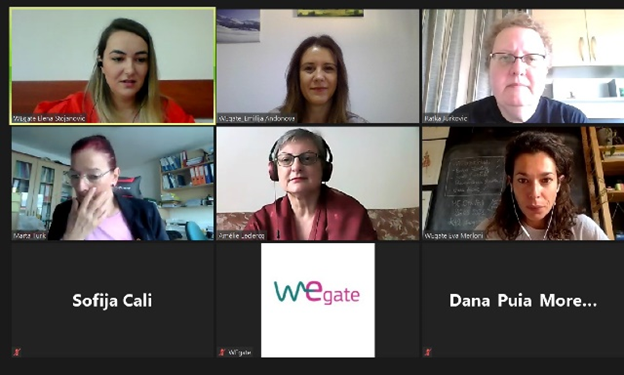
On 10th and 11th of June, the WEgate Training Academy was held, a fruitful event for building capacities of organisations that support women entrepreneurship and women entrepreneurs. During the two days’ sessions, 59 participants, ranging from women entrepreneurship organizations, women entrepreneurs and public institutions from all over Europe, had the opportunity to learn, exchange experiences and interact during the lectures, panel and networking sessions. The event was dynamically moderated by the lively professor and entrepreneur Ms. Ratka Jurkovic, which contributed towards a more vibrant learning experience.
The Academy was launched with opening speeches by Dana Adriana Puia Morel, EC, DG GROW and Eva Merloni, WEgate project manager. They set the scene and elaborated more on the importance of women entrepreneurship, the WEgate project and the opportunities it offers to women entrepreneurs and women entrepreneurship organizations.
The first session, Public policy, achieved the goal of helping participants to better understand the policymaking process, educating them on how to contribute to the improvement of the ecosystem, the policy, the institutional and legal frameworks for women entrepreneurship across Europe. Public policies are of the utmost significance for the promotion and advancement of women entrepreneurship. As the trainer, Ms Marta Turk concluded: “Crucial importance in the policy making process is cooperation with a network of entrepreneurs, associations of WE, chambers of commerce, labour organizations, parliamentarian women, as well as continuous education and knowledge building related to business and personal development, but primarily women entrepreneurship organizations need to work towards awareness rising and promotion of women entrepreneurship.”
During the second interactive session Ms Amélie Leclercq, board member of the European Women’s Lobby, managed to enclose the thematic of Advocacy and representation to the participants through theoretical and practical methods. She covered a range of theories and concepts and explored specific movements and campaigns to illustrate the diversity of movement philosophies, methods and outcomes presented the crucial steps in representation. As Ms Leclerq said: “Don't apologize if you have power. You need it to make decisions and change things for the improvement of women entrepreneurs.”
The second day kicked off with a networking session, which continued during each break, where participants had the chance to meet, mingle, share knowledge and experience. Followed by the first panel, dedicated to “How to run a successful access to finance programme for women?” were Sasha Bezuhanova, founder and chairperson of MOVE BG, Rixt Herklots, director of The Next Women in Amsterdam and Silvia Almeida, representing non-profit organization WomenWinWin in Portugal, moderated by Ms Claire Munck, CEO of BeAngels discussed their experience in running a finance program, what are the challenges women face and how they should deal with them.
They were followed by Francesca Natali, shareholder and board member of META Group who presented “Successfully connecting investment readiness programmes with the financing environment?”. They gave the participants a perspective of the investors, offered a unique and valuable insight into the minds and workings of the risk capital investors. In those terms, valuable tips were shared on increasing investment readiness among women, defining the investment stages and finding a potential financial partner accordingly and getting prepared for presentation in front of venture capitalists.
The final session was focused on Business development services and delivered by Marta-Patricia Aparicio y Montesinos, Founder and Managing Director of Keymon Ventures. The lecture presented varieties of networking methods, tools and experiences which could assist WE organizations in increasing their expertise and capacities directly or in cooperation with other stakeholders/experts, improving their business support skills and equipping them with practical knowledge that they can use in their support programmes and services for business development of the women entrepreneurs. Particular focus was set on effectuation, as a logic of entrepreneurial expertise that both novice and experienced entrepreneurs can use in the highly unpredictable start-up phase of a venture to reduce failure costs for the entrepreneur and evokes creative and transformative tactics.
During the two amazing days, many stories, lectures and contacts were shared. This wasn’t only learning, but an inspiring and networking journey. Join us in our future endeavours and be part of the growing WEgate community.



Copied